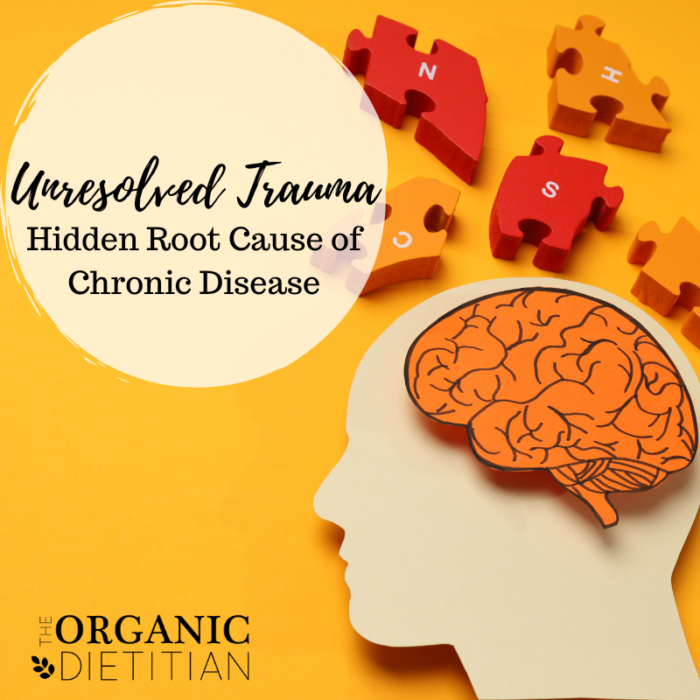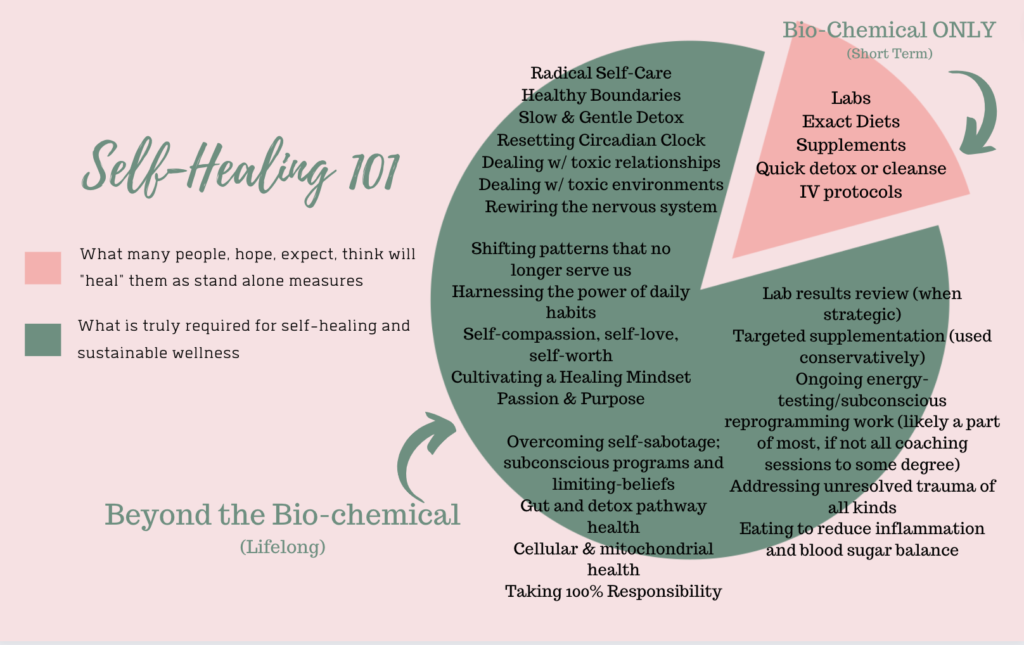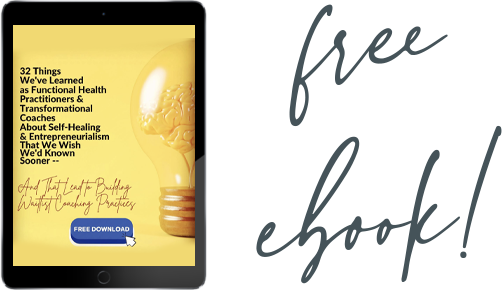9 November, 2023
Unresolved Trauma: The Hidden Root Cause of Chronic Disease That You Need to Know About!

Many people don’t realize the role that unresolved stress and trauma are playing in their health struggles. I used to be one of those people because I did have a good life growing up. The thing is that life can be stressful and traumatic, even with the best intentions. It is a blind spot for many, so let’s shed some light on why unresolved trauma is ONE common root cause of chronic disease that gets overlooked.
When we think of the root causes of disease, we often associate them with physical factors such as poor nutrition, lack of exercise, gut pathogens, or exposure to environmental toxins, including mold. While these factors certainly can play a significant role in our health, there is another DEEPER hidden factor that often goes unnoticed: unresolved trauma.
What is Unresolved Trauma?
Trauma is any experience where…
- One’s internal coping mechanisms are overwhelmed.
- One perceives the experience as a threat to one’s life or well-being (consciously or unconsciously, BIG or little, OVERT or covert, etc.)
- One feels powerless to change, defend against, or flee from the circumstances (may be responsible for caring for family members or juggling the responsibilities at work and at home)
- One is often met with a lack of support, empathy, and validation of their experiences.
- The stress of the experience is not discharged but rather anchored in the nervous system and subconscious, where it lives on and repeatedly hijacks a person’s health and life to varying extremes.
Other ways to describe trauma can also include…
- Too much, for too long
- Too much, too soon
- Too little, for too long
- Too much…with too little…
- Too little…with too much…
Examples of this might include things like…
- Too much overwhelm for too long.
- Too much pushing beyond capacity for too long
- Too much responsibility too soon
- Too much trust given too soon
- Too little sense of safety for too long
- Too little empathy for too long
- Too much hurt with too little time, space, and support to recover
- Too much threat with too little protection
- Too much trust is given with too little loyalty in return.
Trauma can come in many forms, including physical, emotional, and sexual abuse, neglect, natural disasters, accidents, generational or even ongoing stress and anxiety of any kind.
While not all stress is bad, chronic stress and unresolved trauma can have profound effects on our health. When the body is exposed to stress, it mounts a response known as the fight-or-flight response, which triggers the release of hormones like adrenaline and cortisol. These hormones help us stay alert and focused in the face of danger, but when this response is prolonged or excessive, it can lead to various health problems.
One of the biggest issues with unresolved trauma is that it often remains hidden from our conscious awareness. When we experience trauma, our nervous system can become overwhelmed, leading to symptoms like dissociation, numbness, or a feeling of being disconnected from our bodies. These symptoms can make it difficult to recognize and address the underlying trauma, leaving us susceptible to chronic health problems.
For example, unresolved trauma has been linked to a range of physical symptoms like chronic pain, fatigue, digestive issues, and even autoimmune diseases. Researchers have found that individuals with a history of trauma are more likely to develop autoimmune disorders, which occur when the immune system mistakenly attacks healthy tissue in the body. Studies have also shown that individuals with a history of trauma have higher levels of inflammation and oxidative stress – two factors that have been linked to a range of chronic health problems.
Related Blog Post: Connection to Trauma and Autoimmune Disease
Related Blog Post: How Trauma Affects Hormone Health in Women
Healing Unresolved Trauma
Addressing unresolved trauma requires a multifaceted approach that involves addressing the emotional, physical, and spiritual aspects of healing. This might include working with a therapist or counselor, practicing meditation or mindfulness, releasing unresolved emotions, exploring body-based therapies like yoga or massage, incorporating lifestyle changes like optimal nutrition (unique to you), movement, rest, adequate sleep, and SO MUCH MORE. The journey towards healing from unresolved trauma may be long and challenging, but with the right support, it is possible to find greater balance and well-being.

In conclusion, unresolved trauma is most often ONE hidden root cause of disease that can have profound effects on our health and well-being. By becoming more aware of how unresolved trauma may manifest itself in our bodies, we can take steps to address this underlying factor and promote greater health and wellness in our lives. By working to heal our trauma, we can find greater peace, balance, and vitality – both physically and emotionally.
How to Get Support?
If you are a women’s wellness coach or practitioner, becoming trauma-informed is important. Wellness Code Academy practitioner certification program is a dynamic, trauma-informed, beyond-the-biochemical, and truly holistic coaching system that takes…
The deepest dive ever into healing the gut, brain, nervous system, and mitochondria—and also taps into the power of the subconscious mind to support healing the psyche. Learn more HERE.
Learn more about my approach with clients: My Health and Healing Philosophy.
I believe ANY HEALING JOURNEY ultimately needs to involve addressing BOTH the body and mind properly and in order, which will be highly individual.
It also is a HUGE reason why I see many feel stuck on their healing journeys because this concept hasn’t been adequately acknowledged, understood, or addressed.















 80% of chronic dis-ease is rooted in stre
80% of chronic dis-ease is rooted in stre
 As
As 
